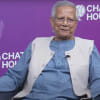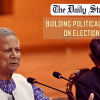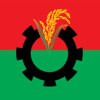Political crisis needs political solution: CEC

The 12th parliamentary elections are only about six months away. But the two largest political parties – the ruling Awami League and opposition BNP – stick to their guns on one crucial matter. BNP wants the election to be held under a non-party election-time government. The AL says the election will be held under the incumbent government led by Sheikh Hasina. Meanwhile, both parties have resorted to showing strengths on the streets.
In this context, how much can the Election Commission do? And how will it ensure that the election is free and fair?
The Daily Star's Mohiuddin Alamgir interviewed Chief Election Commissioner Kazi Habibul Awal on the Commission's preparations, the ongoing political situation and more.
TDS: The people of the country look forward to the upcoming parliamentary elections. How is your preparation?
CEC: The Election Commission is not lagging behind. Preparation is progressing in line with the plan. One major change is that ballots will be used in all constituencies. The Commission earlier declared that votes in no more than 150 seats will be in Electronic Voting Machines (EVMs), subject to availability.
TDS: In the working plan for holding the 12th parliamentary election, the Election Commission mentioned that building the confidence of participating political parties in the government and the Election Commission is a challenge. What measures have been taken to overcome this challenge?
CEC: Certain political parties are expressing no-confidence in the current government and the EC. They have been demanding kind of a non-political neutral government for election time. It is a political issue that seems to be leading to sort of a crisis in holding an inclusive, participatory and peaceful election. The issue and the likely crisis need to be politically settled. The Commission has nothing to do with that.
TDS: How do you plan to ensure the neutrality of field-level admin and police officials who will perform election duties?
CEC: The Election Commission shall try its best under laws and rules to ensure and enforce neutrality of police and administration, if needed. In our 15 months, we did not find them to be unevenly siding with contesting candidates. We believe they will be neutral and professional as public servants in the next parliamentary elections due in December this year or January next year.
TDS: Many say that for domestic and international acceptance of elections, it should be an inclusive one. What do you think about it? What role the Commission will play in holding a participatory election?
CEC: According to the text and the spirit of the Constitution, elections should be inclusive in a multi-party democratic system. How the election will be seen by the international community and to what extent they will accept is one matter. But the more important matter is how the people of Bangladesh will accept the election. People should see and perceive that elections have been inclusive, participatory as well as free and fair. If not, the word "Republic" as envisaged in Article 7 of the Constitution will stand frustrated.
TDS: BNP is one of the largest political parties in the country, and they are repeatedly saying that they will not participate in any election under the current government and the current Commission. What steps have you taken to bring them to the polls?
CEC: We appealed to them to participate in elections. We wrote letters to them as well. But they made their stance known that no elections shall be held under the current political government. They also want the current government to be replaced by a non-political election-time government, and the current Election Commission to be replaced by a new Commission. According to them, the elections can only be held after that. But how will that be implemented!
TDS: The Ruling Awami League is saying that the next general polls will be held in line with the Constitution, meaning under the incumbent government, while the opposition BNP is adamant about having an election-time caretaker government. Will this difference of opinions have any impact on the next general polls?
CEC: It would be most welcome if the difference as stated above could be politically resolved. It is difficult to predict how that may impact the next general elections. But that may lead to kind of an academic polemic over legality and legitimacy.
TDS: Many are saying that Election Commission's power to cancel election and its results has been curtailed through the latest amendment to the Representation of the People Order (RPO) 1972. Do you agree with this?
CEC: We do not at all agree. Powers and responsibility of the Commission have been rather enhanced and more focused through the amendment. Article 91 of the RPO has been amended to substitute the word "election" with the word "polling" so as to make internal consistency or reconcilement between the words "election" and "polling". Why that was done was made clear in writing to the Ministry of Law and to the Parliament. They examined the rationale and agreed. Clause (a) of Article 91 of the RPO empowers the Commission to stop polls at any polling station or entire constituency. That remains as it was. Clauses (b) and (c) of Article 91 have nothing to do with stopping or advance postponement of polling or the election. There has been much ado about nothing with reference to that clerical correction in Article 91. A new clause (aa) added to Article 91 on top of it depicts how powers of the Commission have been enhanced. People may look at the other amendments as well made to the RPO to see how those have enhanced powers and responsibilities of the Commission and protected the rights of voters, candidates, media workers and observers.
TDS: Did the amendment take place in line with EC's proposal or were there any changes made? What are those changes, if any?
CEC: Amendments were made completely in line with the Commission's proposals. However, we agreed with the government's proposal of reconsideration for dropping the words "entire constituency" in the proposed new clause (aa) of Article 91. We found that to be quite logical. That makes no essential difference in the original proposal that we made. The Commission may withhold results of 99 out of 100 centres of a constituency, if needed, under the newly added clause (aa) of Article 91, though it was slightly modified by the Government with consent from the Commission. The said modification is, therefore, immaterial.
TDS: Voters are one of the main stakeholders in the elections. In the recently held by-elections, local government elections, including city elections, the turnout was quite low. Many say that one of the reasons for this low turnout is the lack of people's confidence in the Election Commission and one-sided elections. What's your take on this?
CEC: Turnout was not really quite low in all city and by-elections. Turnouts have been about 59%, 66%, 49%, 48%, 51%, 56% and 47% in seven city elections. If elections at any level starting from union councils to parliament are well-participated and effectively contested, turnout of voters is likely to be higher. It does not depend of the EC alone; it rather depends more on how the candidates play out. In UP elections, as effectively contested, turnouts of voters are much higher. Low turnouts cannot be attributed to the lack of voters' confidence in the EC alone. Parliamentary by-elections were not politically contested in the real sense of the term. Many factors like weather conditions of excessive rainfall, chilling low temperature, demographic factor of the locality, seasonal issues like harvesting, extent of contest etc. combinedly determine the issue of turnouts.
TDS: What measures will you take to ensure that voters can cast their votes freely? Also, ballot stuffing and capturing of centres remain an issue of concern during elections. What special measures will you take regarding this?
CEC: Conducting of elections by the EC is not new. Laws and rules are there in respect to conducting elections. Further, we are learning lessons from past instances as well.
TDS: The Election Commission has installed CCTV cameras in some recent elections. Will you do the same in the national election?
CEC: CCTV cameras are an effective monitoring tool. The Commission has intents to use CCTVs. But National Parliamentary Elections will be held on the same day in about 42,000 centers having about 2,10,000 polling booths. About 300,000 cameras will be required for that. We are looking into whether that will be feasible and technically possible.
TDS: Thank you very much for your time.
CEC: Thank you very much.

 For all latest news, follow The Daily Star's Google News channel.
For all latest news, follow The Daily Star's Google News channel. 








Comments